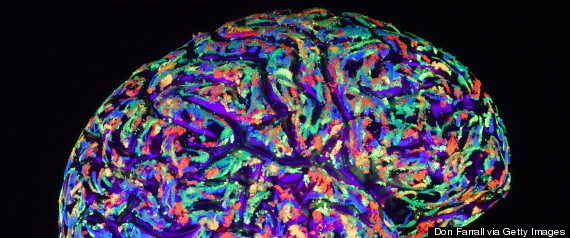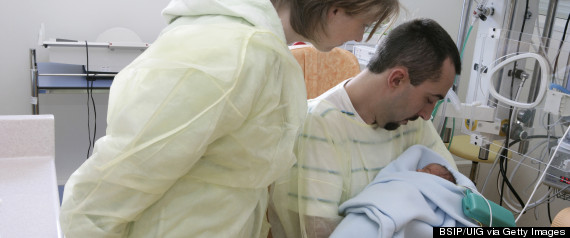
Conversations about premature birth tend to be somber, and with good reason. Preterm birth is a major public health concern -- affecting roughly 1 in 9 babies born in the United States each year -- and one that poses serious short and longterm health risks. Doctors and researchers have done a great deal to understand its causes, but there's still much they do not understand about why certain infants are born early and what can be done to prevent it.
Against that backdrop, it can be easy to lose sight of all the hard work that babies born early do to survive, and even thrive -- whether they're born just shy of 37 weeks, or months before.
"Certainly, our outcomes have improved as technology has improved," said Dr. Edward McCabe, chief medical officer of the March of Dimes. "But premature babies are incredibly strong and resilient." In celebration of that fact, and in time for Prematurity Awareness Month, here are just five ways in which preemies are completely amazing.
1) By the time they leave the hospital, they do some serious bulking up.

"You think about a baby at 24 or 25 weeks, who is born at 500 grams -- and that's certainly not the smallest baby we've seen," said Dr. Stephanie Merhar, an attending neonatologist with Cincinnati Children's Hospital Medical Center. "By the time they leave the NICU and are ready to go home, they're six times that weight, usually. For them to increase their weight by six times ... that's pretty impressive."
That's particularly true given the many feeding-related obstacles preterm babies can face, including problems with sucking, breathing and swallowing. The youngest and smallest of babies get their nutrition intravenously, through a vein, or via a feeding tube until they're able to feed from a bottle or their mother's breasts.
"Twenty years ago, we did not have the ability to give [nutrition] through a vein," Merhar said, "and the vast majority of 24 to 25 week old babies are going to get their nutrition that way. It's not as good as being in the womb, but it's pretty good at helping babies grow and get what they would be getting through the placenta."
2) Their brains go from smooth to developed ...

"When babies are born at 24, 25, 26 weeks, their brains are almost completely smooth -- if you look at the pictures of what a preemie brain looks like -- as compared to a term brain," Merhar said. "[But] by the time they leave the NICU, you can see the normal infoldings and gyrations."
"The cortex, the surface area of the brain, should change from looking like a coffee bean to looking like a walnut while a fetus is in the womb," the BBC explains. But preterm babies' brains have to do all of that hard work after they've been born.
Of course, brain injuries are common in very premature babies and remain one of the biggest risks they face. However, "outcomes truly are -- at least for the most severe disabilities -- improving," said Dr. Kousiki Patra, a neonatologist with Rush University Medical Center in Chicago.
3) ... And their lungs totally transform.

"Lung development [in a preemie] goes through several stages," explained Merhar. Depending on how far along they are, preemies may be born without any alveoli, or important air sacs within their lungs.
"When some of them are born, their lungs are really just starting to fold out," she continued. "They're really just hollow tubes."
The development of surfactant therapy, introduced in the early 1990s, has greatly improved outcomes, cutting the number of deaths from respiratory distress syndrome in preterm babies by half, according to the March of Dimes. Surfactant is a slippery mix of fat and proteins, made in the lungs, that helps keep air sacs from collapsing -- and many preterm babies are born before their lungs produce it. Others use breathing machines or continuous positive airway pressure or "CPAP" machines to help while their lungs do the tricky work of fully developing outside the womb.
4) They recognize their parents' voices (and do better because of it).

"We know that by 20 weeks gestation, babies can recognize their mother's voice," said Patra -- and that holds true when they're out of the womb as well. It's not uncommon to see changes in babies' heart rates, or witness them turning to their parent when they're speaking, indicating they recognize them, she said.
"In the NICU, we really encourage parents to speak to their babies, to sing to their infants. It's not only soothing, but studies have shown it can help with brain development ... maternal voice and particularly maternal singing can help babies feed faster." Indeed, research has shown that music therapy, including lullabies sung by parents, can help improve babies' sleeping and eating patterns as well as their vital signs.
5) They keep making huge strides well after their NICU stay.

Parents of preterm babies are well-versed in the idea of a corrected age -- calculated by subtracting the number of weeks a baby was born preterm from his or her chronological age, which is often used as a measure to track their development. Many doctors and experts will continue to use this age through a child's toddler years and into grade school.
"We can develop all of the technology we want, machines and ventilators to help treat babies [in the NICU], but outcomes are also really tied to what parents do after discharge," said Patra. That can be in terms of reading and singing to their children, feeding them a healthy diet and making sure they regularly attend whatever physical therapy they've been prescribed.
Simply in terms of physical markers, babies born preterm continue to make huge gains as well. "[Many] go through remarkable periods of catch-up growth, which for many comes in that first year of life," Patra said. "You see them, and you can't imagine that they were born preterm."
